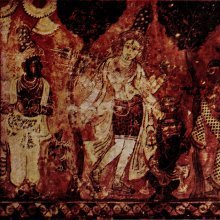State of mind: 1 definition
Introduction:
State of mind means something in Hinduism, Sanskrit. If you want to know the exact meaning, history, etymology or English translation of this term then check out the descriptions on this page. Add your comment or reference to a book if you want to contribute to this summary article.
Images (photo gallery)
In Hinduism
Yoga (school of philosophy)
Source: ORA: Amanaska (king of all yogas): A Critical Edition and Annotated Translation by Jason BirchThe States of Mind are denoted in by the Sanskrit term Manas-Avasthā [caturvidhā manovasthā], according to the Amanaska Yoga treatise dealing with meditation, absorption, yogic powers and liberation.—Accordingly, as Īśvara says to Vāmadeva: “[...] [These] four states of mind (manovasthā) should be known by the wise: disintegrated, coming and going, integrated and absorbed. The disintegrated [mind] is said to be Tamasic, the coming and going [mind], Rajasic, the integrated [mind], Sattvic and the absorbed [mind] is beyond [these] qualities. The disintegrated and coming and going [states of mind] grasp at thought and sense objects. Both the integrated and absorbed [states] destroy thought and sense objects. [...]”.

Yoga is originally considered a branch of Hindu philosophy (astika), but both ancient and modern Yoga combine the physical, mental and spiritual. Yoga teaches various physical techniques also known as āsanas (postures), used for various purposes (eg., meditation, contemplation, relaxation).
See also (Relevant definitions)
Query error!
Full-text (+234): Bhava, Sucitta, Didhi, Moha, Sambhrama, Cittavritti, Brahmavihara, Dana, Four States of Mind, Cetasika, Manodasha, Pattapisoikayga, Abbaratubbara, Asuranishcaya, Manahsthiti, Udasasthiti, Anabhilashe, Manobhavana, Antardarsha, Manovriti.
Relevant text
Search found 270 books and stories containing State of mind, States of mind; (plurals include: State of minds, States of minds). You can also click to the full overview containing English textual excerpts. Below are direct links for the most relevant articles:
Abhidhamma in Daily Life (by Ashin Janakabhivamsa) (by Ashin Janakabhivamsa)
Factor 11 - Upekkha (equminity) < [Chapter 3 - On kusala cetasikas (wholesome mental factors)]
Chapter 4 - Cetasikas Associated With Both Good And Bad Cittas (mind)
Factor 4 - Uddhacca (distraction, restlessness, wavering) < [Chapter 2 - On akusala cetasikas (unwholesome mental factors)]
The Buddhist Path to Enlightenment (study) (by Dr Kala Acharya)
1.3.3. Cittānupassanā–Contemplation of the Mind < [Chapter 2 - Five Groups of Factor]
2.2. The Fourfold Supreme Endeavour (Introduction) < [Chapter 2 - Five Groups of Factor]
2.2.3. Develop Wholesome States of Mind < [Chapter 2 - Five Groups of Factor]
Taittiriya Upanishad Bhashya Vartika (by R. Balasubramanian)
The Nervous System in Yoga and Tantra (Study) (by Ashok Majumdar)
8. Yoni Mudra < [Chapter 2 - The Eight Components of Yoga]
1. The meaning of the word Yoga < [Chapter 2 - The Eight Components of Yoga]
The concept of Conciousness < [Chapter 2 - The Eight Components of Yoga]
A History of Indian Philosophy Volume 1 (by Surendranath Dasgupta)
Part 22 - Citta < [Chapter VII - The Kapila and the Pātañjala Sāṃkhya (yoga)]
Part 17 - Vedānta Ethics and Vedānta Emancipation < [Chapter X - The Śaṅkara School Of Vedānta]
Part 20 - The Cognitive Process and some characteristics of Citta < [Chapter VII - The Kapila and the Pātañjala Sāṃkhya (yoga)]
Yoga-sutra with Bhashya Vivarana (study) (by Susmi Sabu)
Yoga Sutra or Samkhya Pravachana < [Chapter 2 - Origin and Development of Yoga Philosophy]
The concept of Samapatti (balanced state of mind) < [Chapter 4 - Textual Examination of the Text]
Mind and its Nature (in Yoga) < [Chapter 4 - Textual Examination of the Text]
